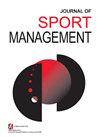体育产业中远程工作对家庭和工作动态的影响
IF 3.5
2区 管理学
Q1 HOSPITALITY, LEISURE, SPORT & TOURISM
引用次数: 3
摘要
本研究的目的是调查美国大学体育运动中需要的远程工作对工作-家庭溢出的影响。特别是,当员工的工作环境从传统的工作期望转变为在家工作时,我们研究了工作-家庭溢出效应(积极和消极)、工作承诺和工作狂的变化,以及这些变化是否至少部分归因于父母的责任。数据收集于2019年11月和2020年5月,分别来自全国大学体育协会(NCAA)体育部门的全职员工(n = 1139),这些员工在2019冠状病毒病大流行爆发后和向远程工作过渡后。结果显示,体育员工发现远程工作有很多好处,包括工作与家庭的负面溢出效应显著降低。然而,在家有孩子的员工报告说,在远程工作后,家庭工作的负面溢出程度更高。在转向远程工作后,工作狂的比例也更高。讨论了理论和实践意义。本文章由计算机程序翻译,如有差异,请以英文原文为准。
The Effect of Remote Work on Family and Work Dynamics Within the Sport Industry
The purpose of this study was to investigate the effect of required remote work on work–family spillover within U.S. college sport. In particular, we examined the changes in work–family spillover (positive and negative), job commitment, and workaholism as employee’s work environment changed from traditional work expectations to work from home, and if these changes were, at least partially, due to parental responsibilities. Data were collected from full-time, National Collegiate Athletic Association (NCAA) athletic department employees (n = 1,139) in November 2019 and again in May 2020 following the onset of the COVID-19 pandemic and after the transition to remote work. Results showed that sport employees found a number of benefits associated with working remotely, including a significant decrease in negative work–family spillover. However, employees with children at home reported higher levels of negative family–work spillover after going to remote work. Workaholism was also higher after the move to remote work. Both theoretical and practical implications are discussed.
求助全文
通过发布文献求助,成功后即可免费获取论文全文。
去求助
来源期刊

Journal of Sport Management
社会科学-运动科学
CiteScore
5.80
自引率
19.40%
发文量
33
审稿时长
>12 weeks
期刊介绍:
The sport management industry is growing by leaps and bounds, with an explosion in research projects, texts, and university programs. As the field continues to rapidly evolve, it’s imperative for sport managers to keep abreast of the latest developments. The peer-reviewed Journal of Sport Management (JSM) is your key to staying on top of current issues and trends in this dynamic field. An official journal of the North American Society for Sport Management, JSM brings you thought-provoking editorials, research articles, and reviews that examine a number of areas as they relate to the management, governance, and consumption of sport, such as: organizational theory, behavior, and strategy; sport operations; marketing, consumer behavior, sponsorship, advertising, and licensing; media, communications, and public relations; sport tourism; facility and event management; and gender and diversity.
 求助内容:
求助内容: 应助结果提醒方式:
应助结果提醒方式:


